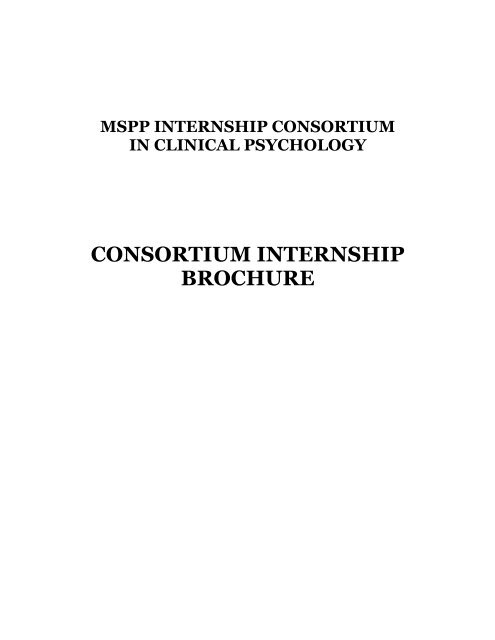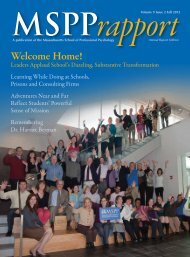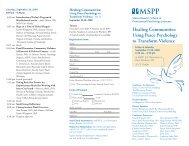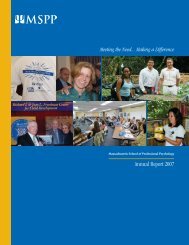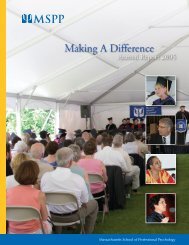MSPP Consortium Internship Brochure - Massachusetts School of ...
MSPP Consortium Internship Brochure - Massachusetts School of ...
MSPP Consortium Internship Brochure - Massachusetts School of ...
Create successful ePaper yourself
Turn your PDF publications into a flip-book with our unique Google optimized e-Paper software.
<strong>MSPP</strong> INTERNSHIP CONSORTIUMIN CLINICAL PSYCHOLOGYCONSORTIUM INTERNSHIPBROCHURE
IntroductionThis internship <strong>Consortium</strong> in Clinical Psychology is exclusively affiliated with the<strong>Massachusetts</strong> <strong>School</strong> <strong>of</strong> Pr<strong>of</strong>essional Psychology (<strong>MSPP</strong>).From the very beginning <strong>MSPP</strong> was designed with a practitioner or pr<strong>of</strong>essional model <strong>of</strong>training. The program philosophy is one that deems training in pr<strong>of</strong>essional psychology tobe most effective when theoretical learning and practical applications occur simultaneously,and their integration is actively facilitated as part <strong>of</strong> the learning process.The exclusively affiliated <strong>MSPP</strong> <strong>Internship</strong> <strong>Consortium</strong> in Clinical Psychology extends thisimperative by providing a range <strong>of</strong> well-coordinated pr<strong>of</strong>essional training experiencesacross five training sites in the community. For two years, either at one agency/institutionor at two different institutions, interns spend between 27 hours per week at consortiuminternship sites. Included in this time is attendance at shared weekly consortium trainingseminars held at <strong>MSPP</strong> and led by an <strong>MSPP</strong> faculty member with contributions fromsupervisors from the different sites as well as by various <strong>MSPP</strong> faculty members and guestpresenters. A total <strong>of</strong> 2000 internship hours, in no more than 24 months, is required.Half-Time <strong>Internship</strong> SitesThe <strong>MSPP</strong> <strong>Internship</strong> <strong>Consortium</strong> is comprised <strong>of</strong> the following five training sites:Faulkner Hospital (27 hours per week; 10 months)Faulkner Hospital is a 150 bed non-pr<strong>of</strong>it, JCAHO accredited, community teaching hospitallocated in Jamaica Plain, just 3.4 miles from the Longwood medical area, and across thestreet from the Arnold Arboretum.This site's orientation is primarily psychodynamic, with a multi-disciplinary staff. Thetraining experience is on a twenty-four bed adult inpatient psychiatric unit and a partialhospital program. It is designed to give interns an intensive experience in the care <strong>of</strong> acutepatients.Lynn Community Health Center (27 hours per week; 20 months)Lynn Community Health Center is a JCAHO accredited, private nonpr<strong>of</strong>it multi-servicelicensed clinic for the practice <strong>of</strong> medicine, mental health, and substance abuse services,dental services, and pharmacy.Interns participate in the provision <strong>of</strong> the behavioral health services for all ages whichincludes: consultations to families, schools, and community agencies; and integratedholistic care.2
The <strong>MSPP</strong> <strong>Internship</strong> <strong>Consortium</strong> training is consistent with the National Colleges and<strong>School</strong>s <strong>of</strong> Pr<strong>of</strong>essional Psychology (NCSPP) model. The internship is based on thiscompetency model <strong>of</strong> training. The goal <strong>of</strong> the internship is to intensify and expand theinterns’ development in these areas. This occurs by <strong>of</strong>fering increasingly more challengingexperiences as well as a higher level <strong>of</strong> responsibility as the intern matures pr<strong>of</strong>essionally.The <strong>MSPP</strong> <strong>Internship</strong> <strong>Consortium</strong>, committed to high quality training in pr<strong>of</strong>essionalpsychology, is designed to facilitate the accomplishment <strong>of</strong> the following eight internshipgoals.GOALS AND OBJECTIVESI. Development <strong>of</strong> Psychological Testing/Diagnostic Assessment Skills• The intern will be able to gather appropriate history and background information onclients and make appropriate diagnostic formulations.• The intern will be able to recommend the appropriate treatment, testing and/orreferral.• The intern pr<strong>of</strong>iciently chooses, administers, and interprets commonly used tests inhis/her area <strong>of</strong> practice.• The intern writes a well-organized psychological report, answering the referralquestion clearly and providing the referral source with specific recommendations forpatient care.II. Development <strong>of</strong> Psychotherapeutic Intervention Skills• The intern will be able to establish and maintain an appropriate therapeuticrelationship with clients.• The intern will be able to conceptualize client’s problems in a theoretical frameworkand have awareness <strong>of</strong> different theoretical models and the rationale for choosingeach.• The intern will be able to select and implement appropriate empirically validatedtherapeutic techniques.III. Establishment <strong>of</strong> Appropriate Pr<strong>of</strong>essional Relationships/Development <strong>of</strong>Pr<strong>of</strong>essional Identity• The intern will be prepared for supervision, and possess the ability to accept andutilize feedback from supervisors.• The intern will demonstrate pr<strong>of</strong>essional demeanor/attitude and behavior.IV. Culturally Competent Work with Diverse Populations• The intern will possess the knowledge, skills, and attitudes to provide culturallycompetent psychological services.V. Ethical Standards <strong>of</strong> Practice• The intern will have the ability to determine which ethical standards to apply inparticular situations and adhere to those standards.• The intern will demonstrate an understanding <strong>of</strong> relevant state and local laws, theirinteraction with the APA Ethics Code and their application to pr<strong>of</strong>essional practice.4
Vivian Peterson, LICSWChristine Rayner, M.D.David Savitzky, M.D.Tara Sayegh, RNRomelyn Woodruff, LMHC, APRNOther Psychologist Contributors toProgram:Harry Parad, Ph.D.Direct ServiceAssessment competency is furthered by the administration <strong>of</strong> psychological tests and reportwriting, as well as diagnostic interviewing and client and program evaluation.Intervention competency is addressed in the variety and diversity <strong>of</strong> clients seen, as well asthe variety <strong>of</strong> treatment approaches and modalities <strong>of</strong> treatment utilized. Psychotherapy isconducted at all internship sites and many involve individual, group, couple or familytherapy and may be brief or longer term. Crisis intervention is <strong>of</strong>ten part <strong>of</strong> internshipexperiences, either formally as part <strong>of</strong> the service responsibilities or informally as crisesoccur during ongoing therapy.Relationship competency is achieved through the initial internship search (i.e., theinterviewing process itself), as well as through peer relationship with other interns,supervisory and pr<strong>of</strong>essional relationships with staff, as well as via client contact.Diversity competency is demonstrated by an awareness and practice according to the APAMulticultural Guidelines (Appendix 3) and in so doing, promoting multicultural skills andcompetencies in practice. A weekly <strong>Consortium</strong> Seminar facilitates personal andpr<strong>of</strong>essional awareness.Ethics competency is demonstrated by the application <strong>of</strong> the current Ethical Principles <strong>of</strong>Psychologists and the Code <strong>of</strong> Conduct <strong>of</strong> APA (Appendix 2) in the analysis <strong>of</strong> ethicallyproblematic situations addressed in the internship site in supervision and trainings and inthe <strong>Consortium</strong> Pr<strong>of</strong>essional Issues seminar.Consultation and Education competency is addressed during internships throughsupervised clinical consultations to schools, parents, court systems, primary carephysicians, other mental health pr<strong>of</strong>essionals, faculty and the like, depending on the site.Also, psycho-educational opportunities are available through group interventions.Research and Evaluation competency is viewed through clinical case presentations givenby the intern in their interdisciplinary clinical setting, as well as through traditionalresearch, doctoral projects, and program evaluation opportunities.Supervision and Management competency is met as interns consult weekly with assignedpracticum interns on a one-to-one basis. This supervisory experience is discussed in asupervision group with other supervising interns and led by an <strong>MSPP</strong> faculty member.7
ResearchThe practitioner-scholar model is greatly valued by the <strong>Consortium</strong>. Interns areencouraged and supported in their research efforts. Interns may participate in ongoingapplied research projects conducted at their <strong>Consortium</strong> site and participate in supervisoryand training discussions incorporating evidence based treatment. Interns are also requiredto attend at least three doctoral colloquia. Attendance and presentations at local andnational conferences are encouraged.Weekly Schedule <strong>of</strong> Intern Activities (Sample)Hours listed are averages andactivities may change each semester.First YearHalf-timeSecond YearHalf-timeHours/week Hours/weekTrainingIndividual supervision 2 2Group supervision 1 1<strong>Consortium</strong> Seminars 2 2On-Site <strong>Internship</strong> Seminars 2 2Sub-Total: 7 7Direct Service (face-to-face) (Intervention 10 -14 10-14& Assessment)Supervision & ConsultationSupervision <strong>of</strong> Practicum Student 1*AdministrationStaff Meeting-Charting-Case Notes etc. 6-10 6-10Total Average Hours: 27 27* Note: <strong>MSPP</strong> Supervision <strong>of</strong> Practicum Students is in addition tointernship hours.EvaluationThe two year half-time internship training experience is coordinated utilizing anAssessment and Planning conference which precedes each training year. The intern’sacademic advisor chairs this conference which is attended by the intern, the <strong>Consortium</strong>Coordinators and/or primary site supervisors from both the previous and forthcoming fieldsites. The intern, a selected peer, as well as another faculty member also attend thisconference which is held prior to beginning each year <strong>of</strong> internship. During thisconference, goals are developed for the intern’s forthcoming subsequent internship year(s).Consistent with the <strong>MSPP</strong> philosophy <strong>of</strong> linking course work and field training, each year <strong>of</strong>internship has a designated faculty member to integrate the two experiences. The advisor8
serves in this capacity as well as the instructors <strong>of</strong> the Advanced Clinical Seminar: Theoryand Practice <strong>of</strong> Supervision course.The <strong>MSPP</strong> <strong>Consortium</strong> Director reviews evaluations <strong>of</strong> both the interns and sites innumerous, ongoing ways to ensure that training goals and objectives are beingaccomplished and that the <strong>Consortium</strong> resources and processes are adequate.In the fall <strong>of</strong> each internship year the <strong>Consortium</strong> Director consults with the primarysupervisor as to whether the intern is at the anticipated level <strong>of</strong> performance at that time,along many dimensions (e.g., use <strong>of</strong> supervision, quality and quantity <strong>of</strong> service delivery,pr<strong>of</strong>essional relationships and behavior) as well as if progress is being made toward goalsspecified on the intern’s Field Placement Contract. If there are concerns/questions raised,consultations will occur between the necessary parties (the intern, primary supervisor,<strong>Consortium</strong> Director, faculty advisor). These consultations may be by phone or in a sitevisit.At the end <strong>of</strong> the first half <strong>of</strong> the internship year(s), supervisors complete a the Mid-YearEvaluation Form (Appendix 6) (assessing the interns’ performance to date. This evaluationis first shared with the intern and then is submitted to the <strong>Consortium</strong> Office fordissemination to the <strong>Consortium</strong> Director and the intern’s academic advisor. If problemsare evident, a consultation will ensue. If necessary, an intermediate Assessment andPlanning Conference will be held and a written remediation plan devised.When each training year is coming to an end, the primary supervisor submits the Final<strong>Internship</strong> Evaluation Form (Appendix 7).The Assessment and Planning conference is the final evaluative experience <strong>of</strong> each trainingyear. The intern’s performance, both in the field and in the classroom, is discussed in anintegrative manner. A critical review occurs determining if goals and objectives were metduring the past internship experience and whether competency at the pre-doctoralinternship level was attained. New goals and objectives are then constructed for the secondhalf-time internship year and these goals are documented on the Field Placement Contract(Appendix 5). The primary supervisor for the upcoming training year signs the Contractto indicate agreement, as do the intern and faculty advisor.To evaluate the quality and effectiveness <strong>of</strong> internship sites, both the intern and the<strong>Consortium</strong> Director are involved. Twice during each internship year, interns are requiredto complete a Site Evaluation Form (Appendix 8) documenting the quality <strong>of</strong> supervisionand training, the adequacy <strong>of</strong> the site’s physical resources, and the quality and quantity <strong>of</strong>opportunities to provide service delivery. These forms are reviewed by the <strong>Consortium</strong>Director and if areas <strong>of</strong> concern are noted, these are discussed with the internship site’s<strong>Consortium</strong> Coordinator and/or primary supervisor. Plans for improvement ormodification are devised and implemented.In addition to site visits generated out <strong>of</strong> concern, the <strong>MSPP</strong> Field Education Officeconducts routine site visits.9
Stipend and BenefitsInterns are expected to complete 2000 hours during their two year half-time internshipexperience with the <strong>Consortium</strong>. The stipend for half-time interns is $8,500.00 yearly. Inaddition, interns receive the following benefits: 10 annual vacation days, 9 holidays, andsick leave.FacilitiesInterns have pr<strong>of</strong>essional <strong>of</strong>fice space furnished in a typical manner with desks, chairs, andtelephone. Administrative/secretarial support services and <strong>of</strong>fice supplies are available asneeded. Interns have access to computers and the internet at sites and/or at <strong>MSPP</strong>.<strong>Consortium</strong> interns have unlimited access to the <strong>MSPP</strong> library, including use <strong>of</strong> twelvecomputers with internet access. Library services at <strong>MSPP</strong> have been designed to fullysupport the research needs <strong>of</strong> interns and faculty. The <strong>MSPP</strong> Library develops on anongoing basis a core collection <strong>of</strong> books, scholarly periodicals, assessment materials, newreference materials, and audio-visual material. Acquisition <strong>of</strong> the latest materials in clinicalpsychology is stressed. The library has particularly committed itself to gaining access tocomputerized library services and networks. These efforts have resulted in the readyavailability <strong>of</strong> comprehensive interlibrary loan services and access to the latestcomputerized and online bibliographic databases.Housing and Recreation InformationAll <strong>MSPP</strong> interns are already living in the Greater Boston/New England area as they are inboth classroom and half-time internships simultaneously. Some have specifically chosenthis training model in order to stay in their community with their family. Boston is aculturally rich city <strong>of</strong>fering entertainment in most venues—theatre, sports, music and art.The <strong>MSPP</strong> administration and the <strong>MSPP</strong> Student Coordinating Committee host varioussocial and recreational events for interns as well.Selection Criteria & Procedures<strong>Consortium</strong> interns are selected based on review <strong>of</strong> their academic record, clinicalexperience, letters <strong>of</strong> recommendation and a revised AAPI. All interested applicants areinterviewed.Preference is given to applicants with a strong interest and commitment todeveloping multi-cultural competency.The <strong>Consortium</strong> application information is available on the internet atwww.mspp.edu/consortium and incorporates revisions. Applications are due January 3,2012. Applications must include: cover letter, revised AAPI and current resume/vita. Theinternship generally begins in mid- August/September, depending on the track.A more detailed description <strong>of</strong> the selection requirements and procedures can be found onthe <strong>MSPP</strong> website, www.mspp.edu/consortium. in the document entitled <strong>Internship</strong><strong>Consortium</strong> Selection Criteria and Procedures.The <strong>MSPP</strong> <strong>Internship</strong> <strong>Consortium</strong> adheres to affirmative action policies.10
Please direct all <strong>Consortium</strong> related inquiries to:Randi S. Dorn, Ed.D.,ABPP<strong>Consortium</strong> Training Directorrandi_dorn@mspp.edu<strong>Consortium</strong> Coordinators:Faulkner Hospital<strong>Consortium</strong> Coordinator: Kevin Donnelly, Ph.D._______________________________________________Lynn Community Health Center<strong>Consortium</strong> Coordinators: Angela Wilbur, Psy.D._______________________________________________Rhode Island College Counseling Center<strong>Consortium</strong> Coordinator: Thomas J. Lavin Ph.D._______________________________________________Roger Williams University Center for Counseling and Student Development<strong>Consortium</strong> Coordinators: Jim Azar, Ph.D.; Jim Woodruff, Ph. D.Wediko Children’s Services<strong>Consortium</strong> Coordinator: Ed Zadravec, Psy.D.<strong>MSPP</strong> <strong>Consortium</strong> InternsInformational data <strong>of</strong> intern demographics, pr<strong>of</strong>essional activities, and post-internshipexperiences is available from 2007 to the present in the <strong>MSPP</strong> Field Placement Office.The <strong>MSPP</strong> <strong>Internship</strong> in Clinical Psychology, being exclusively affiliated with <strong>MSPP</strong>, abidesby the following <strong>MSPP</strong> Equal Opportunity and Affirmative Action Policy Statement:“The Board <strong>of</strong> Trustees <strong>of</strong> the <strong>Massachusetts</strong> <strong>School</strong> <strong>of</strong> Pr<strong>of</strong>essional Psychology reaffirms itscommitment to the policy <strong>of</strong> Equal Opportunity and Affirmative Action. This policy is <strong>of</strong>application to every aspect <strong>of</strong> employment, including the recruitment, hiring, and termsand conditions <strong>of</strong> service <strong>of</strong> all full-time and part-time employees. Personnel andadmissions decisions shall be made in accordance with state and federal law and withoutregard to race, color, religion, sex, age, national or ethnic origin, sexual orientation,Vietnam-era veteran status, political beliefs, or disability unrelated job requirements”It is the express purpose <strong>of</strong> this policy to provide all persons with equal employment andeducational opportunities in an environment promoting cultural and individual diversity.<strong>MSPP</strong> Equal Opportunity and Affirmative Action programs have been and will continue tobe developed to help us accomplish our objectives in this all-important area. Faculty andsupervisory personnel are responsible for assuring that these programs and objectives areboth implemented and achieved.11


